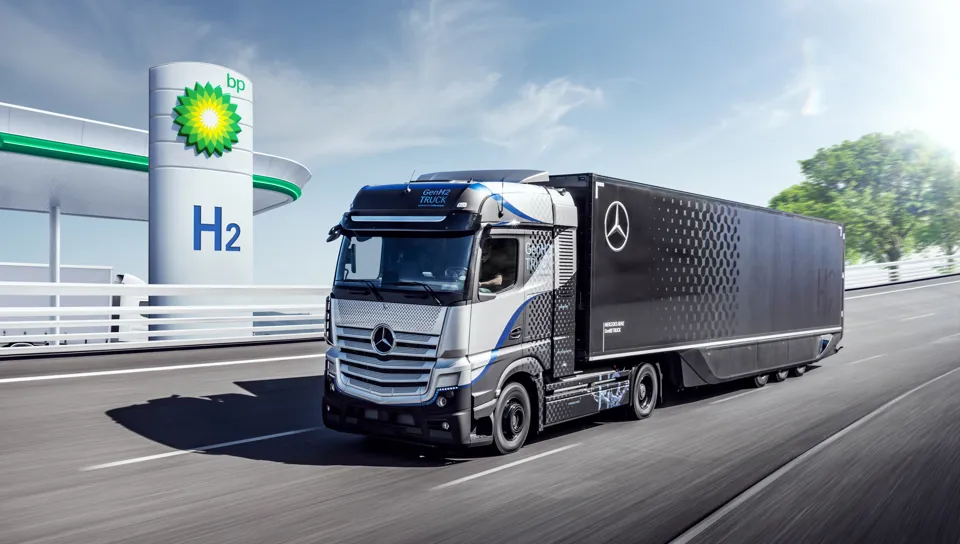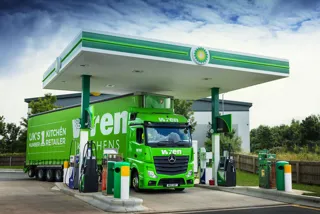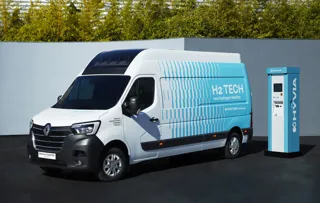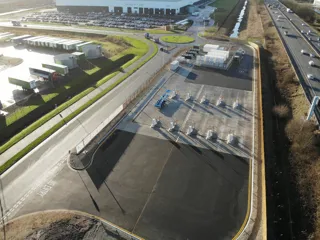Daimler Truck and BP have announced plans to work together to help accelerate the introduction of a hydrogen refuelling network for UK freight transport.
The two companies will pilot both the development of hydrogen infrastructure and the introduction of hydrogen-powered fuel-cell trucks in the UK.
Under their memorandum of understanding, BP expects to initially design, construct, operate and supply a network of up to 25 hydrogen truck refuelling stations across the UK by 2030. BP would supply these stations with ‘green’ hydrogen – generated from water using renewable power. Complementing this, Daimler Truck expects to deliver hydrogen-powered fuel-cell trucks to its UK customers from 2025.
Karin Rådström, CEO of Mercedes-Benz Trucks and member of the Board of Management at Daimler Truck, said: “We are consistently pursuing our vision of CO2-neutral transport. Especially for CO2-neutral long-haul road transportation, the hydrogen-powered fuel-cell drive will become indispensable in the future.
“Together with BP, we want to jointly develop and scale the required hydrogen infrastructure by putting our hydrogen-powered fuel-cell trucks into our customers’ hands and thus supporting the decarbonization of the UK freight network. At the same time, political support plays an important role in promoting the creation of an infrastructure for green hydrogen and making an economically viable use of fuel-cell trucks possible for our customers.”
Emma Delaney, BP’s executive vice president for customer and products, added: “Hydrogen is critical to decarbonizing hard-to-abate sectors – and for heavy and long-distance freight it is sometimes the only answer. Working with a leading manufacturer like Daimler Truck, we can accelerate the deployment of both vehicles and infrastructure and pioneer the use of hydrogen to fuel the next generation of UK freight. From producing and supplying hydrogen through to building and operating the fuelling stations, BP is perfectly positioned to transform transport and ultimately build a better energy future.”
Daimler Truck is testing a new enhanced prototype of its Mercedes-Benz GenH2 Truck on public roads in Germany. The first series-produced GenH2 Truck are expected to be handed over to customers starting in 2027. Daimler Truck has a clear preference for liquid hydrogen. In this state, the energy carrier has a far higher energy density in relation to volume than gaseous hydrogen. As a result, the tanks of a fuel-cell truck using liquid hydrogen are much smaller and, due to the lower pressure, significantly lighter. This gives the trucks more cargo space and a higher payload. At the same time, more hydrogen can be carried, which significantly increases the trucks’ range.
BP aims to develop a leading market position producing and supplying low-carbon hydrogen. In the UK, BP has plans to build a hydrogen-producing facility in Teesside, which could produce 1GW of blue hydrogen, produced from natural gas integrated with carbon capture and storage. BP is also exploring the potential for green hydrogen in the region, including supporting the development of Teesside as the UK’s first hydrogen transport hub. These activities support the UK government’s target of developing 5GW of hydrogen production by 2030.























Login to comment
Comments
No comments have been made yet.